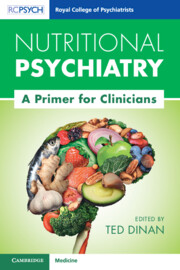Book contents
- Nutritional Psychiatry
- Nutritional Psychiatry
- Copyright page
- Contents
- Contributors
- Preface
- Chapter 1 Basic Principles of Nutrition
- Chapter 2 Diet and the Microbiome–Gut–Brain Axis
- Chapter 3 The Mediterranean Diet and Mental Health
- Chapter 4 Psychobiotics and Fermented Foods
- Chapter 5 Diet Interventions for Anxiety and Depression
- Chapter 6 Schizophrenia, Microbiota and Nutrition
- Chapter 7 Recognising the Importance of Nutrition for Child and Adolescent Mental Health
- Chapter 8 Old Age and Nutrition
- Chapter 9 Broad-Spectrum Micronutrients and Mental Health
- Chapter 10 Epigenetics
- Index
- References
Chapter 5 - Diet Interventions for Anxiety and Depression
Published online by Cambridge University Press: 17 August 2023
- Nutritional Psychiatry
- Nutritional Psychiatry
- Copyright page
- Contents
- Contributors
- Preface
- Chapter 1 Basic Principles of Nutrition
- Chapter 2 Diet and the Microbiome–Gut–Brain Axis
- Chapter 3 The Mediterranean Diet and Mental Health
- Chapter 4 Psychobiotics and Fermented Foods
- Chapter 5 Diet Interventions for Anxiety and Depression
- Chapter 6 Schizophrenia, Microbiota and Nutrition
- Chapter 7 Recognising the Importance of Nutrition for Child and Adolescent Mental Health
- Chapter 8 Old Age and Nutrition
- Chapter 9 Broad-Spectrum Micronutrients and Mental Health
- Chapter 10 Epigenetics
- Index
- References
Summary
Growing evidence from the field of nutritional psychiatry reveals that diet can play an important role in the prevention and/or treatment of depression and possibly anxiety. Healthy dietary patterns, traditional diets such as the Mediterranean diet and other diets such as the Dietary Approaches to Stop Hypertension (DASH) diet, and diets with anti-inflammatory potential have all been studied, with an overall finding of a reduced risk for depression for those with higher adherence to these dietary measures. However, there are several limitations to the research to date, many of which relate to the inherent challenges of studying diet. The exact interplay of mechanisms by which dietary changes can influence mood is as yet unclear, but the gut microbiome is likely intricately involved. Several other proposed pathways through which diet can modify mood include modulation of inflammatory processes, reduction in oxidative stress and modulation of the hypothalamic–pituitary–adrenal axis function. Finally, and importantly, recommendations are provided for mental health clinicians to enable translation of the evidence into practice. Mental health clinicians are well placed to provide nutrition counselling and to use clinical judgement in choosing the specific approach that reflects the needs of the patient but are encouraged to refer to a specialist dietitian where necessary.
- Type
- Chapter
- Information
- Nutritional PsychiatryA Primer for Clinicians, pp. 72 - 100Publisher: Cambridge University PressPrint publication year: 2023



